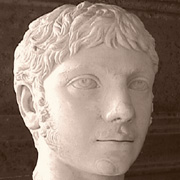A 17th century opera is now waiting to be rediscovered. Francesco Cavalli’s “Eliogabalo”, extremely effective on the stage, was dropped shortly before its planned premiere in 1667. It is now available in a critical edition.
Of all the seventeenth-century operas known to us, Francesco Cavalli’s Eliogabalo is rare in that it survives only as a score, not as a libretto, or both. This is because of the intriguing circumstances surrounding its troubled creation in the Venice of the 1660s. The opera was originally scheduled for the 1667–68 Carnival season at the Teatro Grimani but it was abruptly cancelled shortly before it was to be performed. The librettist Aurelio Aureli was forced to completely rewrite his text on the life of the lascivious and corrupt Roman emperor Heliogabalus. Another composer, the young Giovanni Antonio Boretti replaced the much more experienced Cavalli, then age sixty-five and with an illustrious operatic career behind him. After the first run of performances in the Serenissima, Boretti’s opera, also entitled Eliogabalo, travelled Italy for nine years. Cavalli’s Eliogabalo, instead, ended up in the composer’s drawer.
Cavalli himself however must have thought that Eliogabalo would have seen the stage sooner or later (much later, as it turned out, since his opera had to wait until 1999 to see its world premiere in Crema, his birthplace). Toward the end of his life Cavalli included Eliogabalo among the operas which he wanted to be passed on to future generations and which now form a precious manuscript collection in the Marciana library in Venice. This copy of Eliogabalo – not an autograph, but one bearing Cavalli’s corrections – is the basis for the edition that will be published by Bärenreiter. Since the opera was not performed, no libretto was published, whereas all the librettos attesting to the performances of Boretti’s opera survive, besides its score.
No surviving archival documentation answers the intriguing question of why Cavalli’s opera was withdrawn. Recently, it has been hypothesized that Cavalli’s musical style was perceived as old-fashioned. We know in fact that five years later another opera by Cavalli was cancelled because it was “lacking lively ariette.” Catering to a larger public that enjoyed easy tunes, Venetian operas written in the 1660s and 1670s featured an increased number of arias with fewer recitatives. Cavalli did not follow this trend. He remained faithful to the model established by his teacher Claudio Monteverdi, prioritizing dramatic effect over the mere display of singers’ vocal abilities. His Eliogabalo might have been cancelled because of too much recitative and too few tunes. Today, instead, we can fully appreciate the power of Cavalli’s recitative: as in the duets in which Flavia and Eritea, the women repeatedly harrassed by the libertine emperor with the connivance of his servants and confidant (Lenia, Nerbulone, and Zotico respectively), engage in heated debates with their lovers (respectively Alessandro and Giuliano) pondering what to do next. These duets show one of the most modern aspects of Cavalli’s opera, the verbal and musical portrayal of the devastating consequences of sexual harrassment within a politically charged environment.
But it is again a comparison between the two Eliogabalos – Cavalli’s and Boretti’s – that not only reveals elements accounting for the failure of Cavalli’s opera, but also sheds light on its dramatic power. The plots share two dominant themes. Firstly, Eliogabalo's behavior is very similar: instead of ruling the Roman Empire, the libertine emperor obsessively chases women, thus emblematizing vice. Secondly, in both operas Alessandro, Eliogabalo’s cousin and successor, represents the emperor’s virtuous counterpart: he is virile, diligent in his duties, and faithful to his beloved. More striking than the similarities are however the differences. In the Cavalli finale, the lascivious, effeminate emperor is brutally killed (off-stage) and Alessandro becomes the new emperor. In contrast, in Boretti’s opera, Eliogabalo survives the soldiers’ revolt, regrets his evil deeds, and continues to rule with Alessandro’s help. By showing the repentance of the ruler (instead of his slaying) the later opera adhered to one of the main tenets of Catholic political thought of its time – it was acceptable to slay the tyrant who usurped the throne, but not the legitimate ruler-turned-oppressor (e.g., Heliogabalus). Repentance was, for example, the value most emphasized in Jesuit plays, and we know that the Jesuits were indeed a powerful political force in the Venice of the 1660s.
Cavalli’s opera then, with its brutal finale, was problematic in its time not only in terms of musical style but also because its plot, specifically the dénouement, did not fit the dominant political ideology. Indeed, one can say that the opera was ahead of its time. Today, Eliogabalo – the Don Giovanni of the seventeenth century – can thrive in opera houses precisely because of the powerful way in which, musically and dramatically, it deals on stage with the everlasting issue of the relationships between sex and power.
Mauro Calcagno
from [t]akte 2/2010



